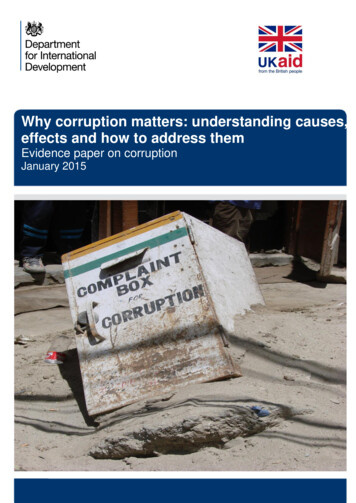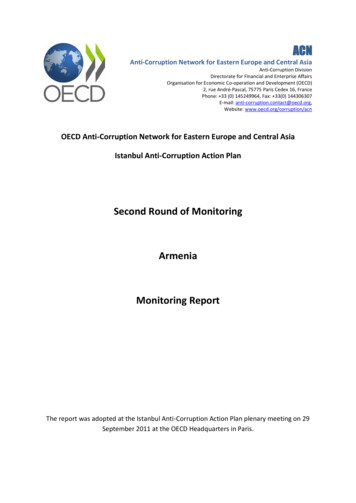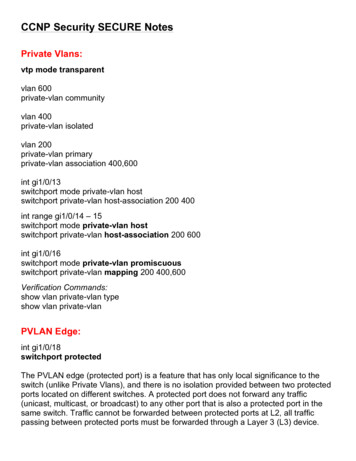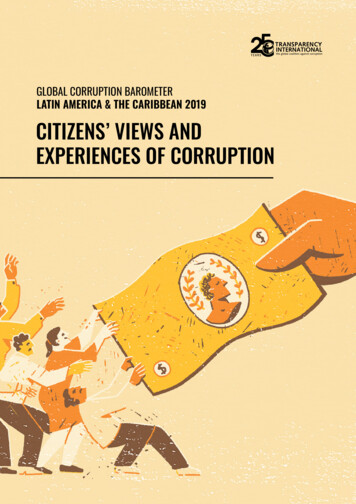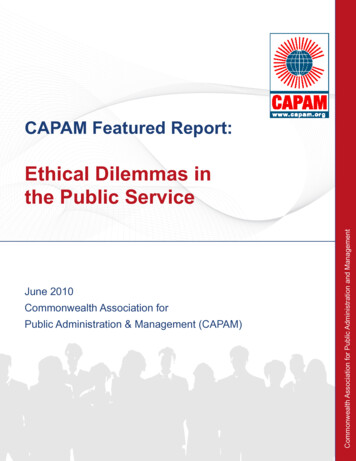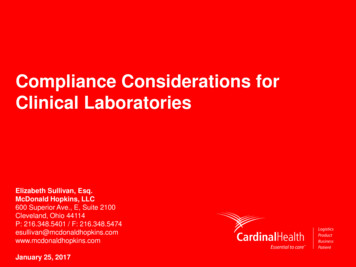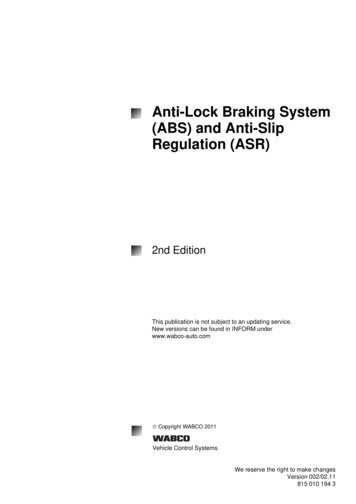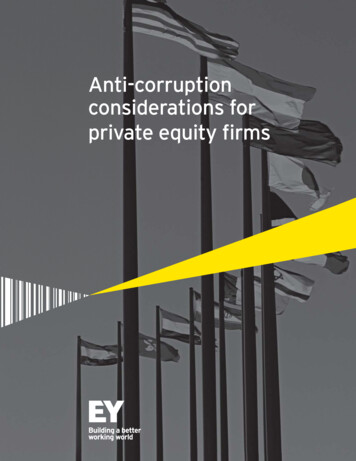
Transcription
Anti-corruptionconsiderations forprivate equity firms
Anti-corruptionrisksto private equityFinancial riskOperational riskReputational risk Impaired value of the acquiredcompany where value wasbased on revenues generatedfrom bribe-paying Delays in closing due toidentification of a problemat the last minute Difficulty attracting capitalfor future investments dueto negative reputation drivenfrom prior bad acts Significant expensesassociated with conductingan internal investigation,responding to regulatoryinquiries and, payment ofsignificant fines and penaltiesfor those issues identifiedpost-close and relatedlitigation costs Loss of expected revenuedue to segment/specificoperations inherited whereproblem is concentrated Successor liability for PE firmand directors due to violativeactivity performed by theportfolio company — even priorto ownership by the PE firm Difficulty attracting fundingfrom certain SWF investorsif benefits, gifts, travel andentertainment are not beprovided at expected levels Inability to divest or exit frominvestment if problem isinherited and not remedied Loss of key customerand associated expectedsales revenue due torelationship built on sidedeals and/or kickbacks Difficulty engaging upstanding,qualified suppliers,consultants and placementagents due to requiring thirdparties to sign anti-corruptiondue diligence certifications Loss of key supplier/supplierdiscounts due to improperrelationship or relationshipbuilt on bribe paying No knowledge of potentialbooks and records issues dueto denied access or inabilityto audit Liability exposure for directors,fund managers, executives orother associated individualscharged with management orguidance responsibilities overthe portfolio company
Anti-corruption considerationsThe FCPA, enacted in 1977, prohibits US companies, their subsidiaries, officers,directors or employees from bribing foreign officials, either directly or indirectlythrough intermediaries, for the purpose of obtaining or retaining business.The Foreign Corrupt Practices Act (FCPA) has becomean enforcement priority for regulators and a majorcompliance issue for US companies with overseasoperations. The US Securities and Exchange Commission(SEC) and the US Department of Justice (DOJ) havestepped up efforts to investigate and prosecute businesscorruption, significantly raising the reputational andfinancial risks to companies. The FCPA, enacted in 1977,prohibits US companies, their subsidiaries, officers,directors or employees from bribing foreign officials,either directly or indirectly through intermediaries, for thepurpose of obtaining or retaining business. It also requirescompanies registered with the SEC to keep accuraterecords of all business transactions and maintain aneffective system of internal accounting controls.During 2010 and 2011, we saw a continued surge incorporate cases against large corporations by the USauthorities. In 2010, the DOJ and SEC together chargedor otherwise alleged violations of the FCPA against47 companies and levied more than 1.7 billion intotal penalties.1 In 2011, US authorities imposed fines,penalties and disgorgement amounting to more than 509 million in 16 corporate cases, demonstratingthat the US enforcement authorities are continuing topursue FCPA cases aggressively.2 During 2011, 31% ofenforcement actions targeted non-US companies, andrecord number of charges were against non-US individuals(12 of the 18 individual cases) leading many to believethat the US government will continue to use its expansiveview of jurisdiction under the FCPA.3Anti-bribery enforcement is continuing to be a priorityoutside the US as well. The UK Bribery Act of 2010(the Act), which went into effect on July 1, 2011, hasattracted the most attention on the international front.The Act poses a host of new challenges, includingpotentially broad grounds of jurisdiction, reachingcompanies and partnerships established outside the UKbut that “carry on” a business in the UK.4 The expansivestatute covers commercial bribery and does not havean exception for facilitation payments, going beyondthe provisions of the FCPA. In addition, the Act containsan affirmative defense that will allow a company toavoid liability if it demonstrates that it had “adequateprocedures” in place designed to prevent such bribery.5However, as with the FCPA, there is no requirement ofactual knowledge — what is known and what you shouldhave known are equally important.1Shearman & Sterling LLP, FCPA Digest, January 2011, p. 8.2Shearman & Sterling LLP, FCPA Digest, January 2012, pgs 5–7.3Shearman & Sterling LLP, FCPA Digest, January 2012, p. 5.4Shearman & Sterling LLP, FCPA Digest, January 2011, p. 25.5On March 30, 2011, the UK Ministry of Justice issued the implementation guidance asto what constitutes adequate procedures and announced that the Act will be effectiveon July 1, 2011.Anti-corruption considerations for private equity firms 3
Anti-corruption regulation effectsThe current SEC focus appears to be on improper payments or conferred benefits toobtain or retain business and relationships with sovereign-wealth funds. FCPA penaltiesare significant and include criminal and civil penalties for the company and individuals.Private equity firms should be aware that the SEC appearsto be focused on enforcing the FCPA in the financialservices industry. The SEC and DOJ investigationshave targeted industries in the past (e.g., oil and gas,pharmaceuticals, freight forwarding), and they are likelyto continue to expand. In early 2011, the SEC began tomake initial inquiries regarding FCPA practices at certainbanks, private equity firms and hedge funds, specificallyregarding their interactions with sovereign wealth funds(SWFs). The SEC appears to be focused on and is activelyinvestigating fundraising and investing activities. SWFadvisors, private equity firms and hedge funds havebeen on the anti-corruption radar for several years, andSWF employees are considered “foreign officials” by USregulators and therefore within the FCPA’s scope. Thecurrent SEC focus appears to be on improper paymentsor conferred benefits to obtain or retain business andrelationships with SWFs. FCPA penalties are significantand include criminal and civil penalties for the companyand individuals.Mark Mendelsohn, former Deputy Chief of the DOJFraud Section and partner of law firm Paul, Weiss, Rifkind,Wharton & Garrison LLP, told The Wall Street Journal that,“Financial institutions, private-equity funds, hedge fundshave historically paid less attention to FCPA risks thanindustrial companies have. That’s changing. It’s nota straight-forward issue because these institutions allhave different investment strategies. There are somevery real issues about where responsibility for compliancelies. The private-equity fund often will have some of theirpartners or business leaders sitting on the boards of theinvestment companies. So in a very simple way they aregoing to have exposure.”64 Anti-corruption considerations for private equity firmsAdditionally, UK authorities have made clear that thelevel of control over entities will affect the enforcementof corporate offenses under the UK Bribery Act; forprivate equity firms, this means the level of control intheir portfolio companies.7 In a recent meeting with theclients of the law firm Debevoise & Plimpton LLP, SeriousFraud Office Director Richard Alderman warned that evenif they aren’t aware of the bribes, private equity firms areresponsible for the actions of their investee companies.8Alderman also stated, “it may even be that it is a conditionof investment by fund managers allocating funds to you toinvest that you invest only in companies that are FCPA andBribery Act compliant. This is something you will need tobear in mind. You may also need to look at your exposureif you are directors (whether executive or non-executive)in the companies in which you invest.”9Although the SEC is yet to formally charge a private equityfirm based on the conduct of a foreign private companyin its portfolio, during 2011, the SEC investigated theactions a joint venture of one of Europe’s largest insurersfor possible bribery. Although the SEC reportedly decidedto drop its charges due to lack of access to documentationheld by the insurer’s joint venture partner, the actioncertainly suggests that the SEC is taking corruptionat the investment company level seriously.10Furthermore, private equity continues to seek dealsoverseas and sees emerging markets as a “hot ticket.”11Potential investors should be aware of the corruptionrisks present in many developing nations, particularly inthe “BRIC” countries of Brazil, Russia, India and China.While the developing nations promise strong growthopportunities, high costs to clean up those operations,even within an outsourced distributor or sales office,may present enough cause for walking away. Accordingto a survey of corporate executives, investment bankers,
While the developing nations promise strong growth opportunities, high costs to cleanup those operations, even within an outsourced distributor or sales office, may presentenough cause for walking away.private equity executives and hedge fund managersconducted by Mayer Brown, LLP, “63 percent ofrespondents reported that the FCPA and anti-corruptionissues caused their companies to renegotiate or pull outof planned business relationships, mergers or acquisitionsover the last three years.”12As all of this information suggests, understanding thecorruption risks specific to private equity is extremelyimportant given the current regulatory environment. Forinstance, broad successor liability for the prior actionsof an acquisition, which applies when one corporationacquires another, does not apply in the context of anequity investment. However, two features remain centralto any legal claim of responsibility imposed on privateequity firms — how much you control and how muchyou know.6Dionne Searcey, “Former Enforcer Sees Looming Fights,” The Wall Street JournalOnline, March 17, 2011.7Debevoise & Plimpton LLP, “UK Bribery Act Enters Into Force,” June 30, 2011.8Lindsay Fortado, “Private Equity Firms May Be Covered by Bribery Law, SFO Says,”Bloomberg, June 23, 2011.9Norton Rose Group, “The impact of the UK Bribery Act 2010 on the private equityindustry,” August 2011.10“SEC to limit charges against Allianz,” Thompson Reuters, s/News/2011/11 - October/SEC to limit chargesagainst Allianz/, October 14, 2011.11Jason Kelly, “Private-Equity Managers Aim for Emerging Markets as Deals Shrink”,Bloomberg/Businessweek, May 3, 2011.12Mayer Brown, LLP, “Anti-Corruption Compliance for Private Equity andHedge Funds,” November 8, 2011.Anti-corruption considerations for private equity firms 5
How EY’s TransactionForensics works with youWould-be buyers should perform anti-corruption due diligence as a first step inconsidering deals abroad — before, not along with or after traditional due diligence,particularly given the potential for successor liability.Pre- and post-acquisition anti-corruptiondue diligence of a target companyAnti-corruption risk assessments atthe fund and portfolio company levelWould-be buyers should perform anti-corruption duediligence as a first step in considering deals abroad —before, not along with or after traditional due diligence,particularly given the potential for successor liability.Successor liability means that the acquiring companybears responsibility for the people, practices and activitiesbrought along with a purchase, regardless of when andwhere questionable action occurred. The DOJ’s 2008“Halliburton Opinion” (OPR 08-02) set forth the DOJ’sview on the importance of FCPA due diligence and thehigh standards it expects. The Opinion demonstratesthe need for companies making global acquisitions tohave a robust FCPA and anti-corruption due diligenceprocess, including the analysis of company financialand accounting records for at least the last three years.Recent developments in anti-corruption enforcementhighlight the need for PE firms to consider theiranti-corruption compliance programs at the fund andportfolio company levels to understand where potentialrisks could be lurking. The phases of conducting a riskassessment at the fund or portfolio company level aresimilar to the phases of anti-corruption due diligencedescribed previously.Anti-corruption due diligence can be performed in aphased approach. Typically, the first phase includesperforming background checks on target companies,including key individuals at the target such as owners andexecutives, and may extend to identified third parties andagents acting on the target company’s behalf. This phasealso includes interviewing key executives (e.g., legal,compliance, ethics, business development and finance),reviewing anti-corruption policies and procedures, andperforming a high-level risk assessment. Any potentialred flags identified could highlight the need for a secondphase, which could include transaction testing, electronicdocument review, site visits and additional interviews.A third potential phase relates to assisting with theimplementation and monitoring of a post-closinganti-corruption compliance program, including assistingin the development or enhancement of existinganti-corruption policies and training.Phase 1 relates to obtaining a high-level understandingof fund-level or portfolio company operations. One keyis evaluating corruption risks of portfolio companies andfunds based on the location and nature of operations.Many firms use the Corruption Perception Index issuedby Transparency International, a nonprofit organizationlong recognized for ranking countries by corruption riskmetrics.13 The Index can help companies by heighteningawareness of the potential corruption environment basedsolely on the location of their own operations as well asthat of their customers. Obtaining an understanding ofthe sales strategy, key customers (particularly thosethat are government owned or affiliated) and the useof third-party sales agents, consultants or distributorsis also of primary importance.Phase 2 includes performing forensic research,site visits, interviews with key executives, testingand documentation. The key here is to use local EYTransaction Forensics resources who understandlocal practices in addition to US Transaction Forensicsprofessionals who understand the implications of the results.Phase 3 includes distilling acquired insights andassisting in the development or enhancement ofexisting anti-corruption policies and training —locally and globally — to help eliminate future risk.136 Anti-corruption considerations for private equity firmsCorruption Perceptions Index 2011, Transparency International s/, accessed January 6, 2012.
Anti-corruption risk questionsfor private equity firms Are you aware of the requirements ofthe FCPA, the UK Bribery Act and othercountry-specific anti-corruption laws? Do you currently do business withforeign government customers orstate-owned enterprises, includingSWFs? Do you intend to pursue thisbusiness going forward? How confident are you that businessdevelopers, sales personnel, placementagents, investment advisors andportfolio companies understand andcomply with the FCPA, the UK BriberyAct and other anti-corruption laws? Are your anti-corruption policies,procedures, monitoring programs,training and financial controls executedon a consistent and effective basisacross the enterprise? Do your employees have a clearunderstanding of the broad definitionof a government official? Do youremployees understand what isconsidered appropriate versusexcessive spending on gifts, mealsand entertainment-related businessprocurement and retention? Do your financial reporting and traveland entertainment expense reportingsystems provide sufficient transparencyand information details to identify andreview potentially violative paymentsor activities?Why TransactionForensics? Deep anti-corruption and FCPA due diligence,investigative and compliance experiencecoupled with global capabilities and resources,specifically focused on potential issues withcross-border transactions Understanding and experience in helping financialservices firms identify and measure corruptionrisks in various industries Experience assisting private equity clientswith anti-corruption risk assessments andpre-acquisition anti-corruption due diligence Experience assisting companies in their responseto industry-wide corruption initiatives Experience supporting clients responding toDOJ and SEC inquiries and investigations Experience assisting companies in pre-acquisitioncontractual language assessments andpre-arbitration dispute analysis Experience in providing post-acquisitionassistance with preparation of accountingmechanism and post-closing arbitrationand dispute servicesTransaction Forensics is a separateservice line in Ernst & Young LLP’s FraudInvestigation & Dispute Services practice.The practice focuses on due diligence services(primarily related to anti-corruption andother forensic due diligence) and disputesand investigations that stem fromcontemplated and completed mergerand acquisition transactionsAbout the authorsThis paper was written by Greg Wolski andVirginia Adams.Greg Wolski is a partner and the leader ofErnst & Young LLP’s Transaction Forensicsteam within its Fraud Investigation &Dispute Services practice. He can bereached at gregory.wolski@ey.com or 1 312 879 3383.Virginia Adams is a partner on theTransaction Forensics team. She can bereached at virginia.adams@ey.com or 1 212 773 7475.Anti-corruption considerations for private equity firms 7
EY Assurance Tax Transactions AdvisoryAbout EYEY is a global leader in assurance, tax, transaction and advisoryservices. The insights and quality services we deliver help buildtrust and confidence in the capital markets and in economies theworld over. We develop outstanding leaders who team to deliveron our promises to all of our stakeholders. In so doing, we play acritical role in building a better working world for our people, forour clients and for our communities.EY refers to the global organization, and may refer to one or moreof, the member firms of Ernst & Young Global Limited, each ofwhich is a separate legal entity. Ernst & Young Global Limited,a UK company limited by guarantee, does not provide servicesto clients. For more information about our organization, pleasevisit ey.com.Ernst & Young LLP is a client-serving member firm ofErnst & Young Global Limited operating in the US.About Ernst & Young’sFraud Investigation & Dispute ServicesDealing with complex issues of fraud, regulatory compliance andbusiness disputes can detract from efforts to succeed. Bettermanagement of fraud risk and compliance exposure is a critical businesspriority — no matter the industry sector. With our more than 2,000fraud investigation and dispute professionals around the world, weassemble the right multidisciplinary and culturally aligned team to workwith you and your legal advisors. And we work to give you the benefitof our broad sector experience, our deep subject matter knowledge andthe latest insights from our work worldwide.How Ernst & Young’s Global Private Equity Centercan help your businessValue creation goes beyond the private equity investment cycle toportfolio company and fund advice. Ernst & Young’s Global PrivateEquity Center offers a tailored approach to the unique needs of privateequity funds, their transaction processes, investment stewardship andportfolio companies’ performance. We focus on the market, industryand regulatory issues. If you lead a private equity business, we canhelp you meet your evolving requirements and those of your portfoliocompanies from acquisition to exit through a highly integrated globalresource of 152,000 professionals across audit, tax, transactions andadvisory services. Working together, we can help you meet your goalsand compete more effectively. 2013 Ernst & Young LLP.All Rights Reserved.BSC no. 1310-1148413ED Noneey.com[QR code]
Jan 06, 2012 · 6 Anti-corruption considerations for private equity fi rms Would-be buyers should perform anti-corruption due diligence as a fi rst step in considering deals abroad — before, not along with or after traditional due diligence, particularly given the potential for succe
